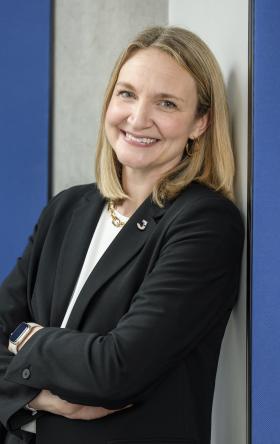
The Climate Change Business Journal (CCBJ) recognized Jacobs with a 2023 CCBJ Business Achievement Award for teaming to deploy one of the first public wireless and in-road wireless systems for charging electric vehicles. EV charging technologies, beyond plug and charge, are evolving in efforts to decarbonize the transportation network. In-road (inductive charging) technologies are quickly developing, and support the transition to electric vehicles, particularly in urban areas where transit and freight vehicles can readily adopt the technology.
Jacobs teamed with Michigan Department of Transportation, the Michigan Office of Future Mobility and Electrification, the City of Detroit, Next Energy and Electreon, a leading provider of wireless charging solutions for EVs, to deploy one of the first public wireless and inroad wireless systems for charging electric vehicles in the U.S. Jacobs was responsible for the design plans, power coordination, and construction inspection of the pilot. The project installed dynamic in-road charging on 14th St. and two in-road static charging locations on Michigan Central’s campus. The charging system will provide power for a Ford eTransit that supplies shuttle services to employees and visitors on the Michigan Central Campus, and to last-mile delivery service vehicles . The first phase of the project opened to service on November 29, 2023. Jacobs is also leading the design of the next phase, scheduled to open in 2025.
CCBJ sat down to interview Andy Wolpert, our market leader and senior project manager who’s focused on advanced mobility.
CCBJ: Tell us about the Michigan Office of Future Mobility and Electrification. How recent is this institution and one other major objective is it pursuing and is Jacobs also partnering with more of these initiatives with the state?
The Office of Future Mobility and Electrification (OFME) supports the Michigan Council on Future Mobility and Electrification. OFME authored the MI Future Mobility Plan to grow Michigan’s mobility leadership and complement the state’s economic development, workforce, energy and infrastructure priorities. Michigan’s priorities are:
- Transition and grow the mobility industry and workforce.
- Provide safer, greener and more accessible transportation infrastructure and services.
- Lead the world in mobility and electrification policy and innovation.
OFME’s priorities directly align with Jacobs’ vision for a safe and accessible transportation system.
CCBJ: What about other states? Are they pursuing similar objectives and accessing federal programs to support them?
Several federal and state initiatives are underway. For instance, Congresswoman Haley Stevens introduced a bill in 2023, allocating $250 million to support wireless charging deployments. Utah legislators funded a Utah State University-Electreon dynamic wireless charging project for freight traffic at the Utah Inland Port. Additionally, California, New York, Pennsylvania, Texas and other states have issued several requests for information (RFIs) and requests for proposals (RFPs) related to wireless electric vehicle charging. This surge in activity reflects growing recognition that wireless charging is a viable solution to address range anxiety, reliability, cost concerns and grid limitations associated with electric vehicles.
CCBJ: What was your original motivation to join this industry?
When I was at the City of Columbus, I served as the Deputy Program Manager for the USDOT- funded Smart Columbus Program. The Smart Columbus work included developing a public EV charging approach to encourage EV adoption. Work at the City revealed challenges associated with EV adoption, including deployment of infrastructure and grid upgrades.
Through that experience, I was able to work on transportation technology projects to improve mobility and the environment for our residents. Speaking with community leaders and residents provided an opportunity to better understand the transportation challenges and environmental issues that are faced on a daily basis. As an engineer, I feel we have the responsibility to provide reliable and sustainable transportation solutions to allow everyone to improve their daily lives and access jobs, goods and services.
CCBJ: Inductive charging has been seen as a futuristic technology with some obstacles in terms of widespread adoption based on interoperability of vehicles and charging mechanisms. How does the Michigan project seek to address these concerns and showcase viability of the technology for electric vehicles?
Electreon’s solution tackles these challenges through a modular and interoperable design. This allows the technology to charge various vehicles (cars, vans, buses, trucks) in different modes, including dynamic (in-motion) and static (stationary) wireless charging. Additionally, the project establishes the ecosystem through public-private partnerships, bringing together the state, city, vehicle manufacturer, technology provider, operator, design and construction firms, the grid utility and others. The project and data collected with it showcase the viability of the technology for various types of electric vehicles.
CCBJ: How did the efficiencies range between dynamic inroad and in road static charging locations. How do these compare with conventional fixed chargers?
Dynamic wireless charging typically achieves efficiencies between 85- 87%, while static wireless charging reaches efficiencies around 90-92%, measured from grid output to battery input. These efficiencies are comparable or slightly lower than those of plug-in charging.
This interview was originally published in the Climate Change Business Journal Volume XVII, Numbers 4-5-6; Second Quarter 2024 “Hydrogen & the Smart Transition.”
About the interviewee

Jacobs Market Leader and Senior Project Manager Andrew (Andy) Wolpert has 24 years of engineering experience ranging from design-build delivery to sophisticated intelligent transportation solutions. Building off a national civil/transportation engineering background, Andy has successfully led multiple, multimillion-dollar technology projects designed to provide equitable, safe and reliable transportation that have advanced mobility at a national level. His leadership and communication skills enabled him to deliver complex projects that required extensive public outreach, managing stakeholder expectations and effective coordination with multiple government (federal, state and local) and private entities. Andy has led multi-disciplinary teams on fast-paced transportation projects, and has used innovation and communication to improve efficiency, accelerate decision-making and reduce costs.














































